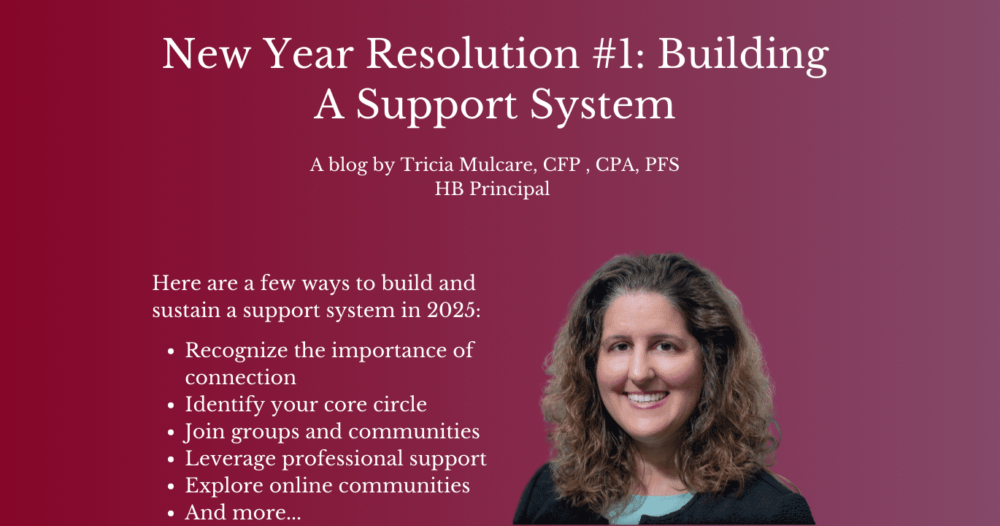With the new year beginning, a recently widowed young client shared that with the new calendar year and planner in hand, she was ready to embrace the next chapter of her journey! In the same breath, and with tears in her eyes, she admitted to feeling completely overwhelmed…without her spouse, she is uncertain just HOW she would be able to do this all alone. From the day-to-day shuffle from activity to activity for the children to managing the bills and household chores…she didn’t know where to begin. After walking this path with clients for many years, I reassured her that the overwhelm is real…and the best approach is to take one minute at a time, one deep breath at a time, and above all, to surround yourself with a strong support system. Regardless of whether you find yourself in these shoes due to a divorce or the sudden loss of a spouse, relying on a robust support system will allow you to reclaim your confidence, direction, and emotional stability.
1.Recognize the Importance of Connection
Isolation often compounds the feelings of sadness and uncertainty that accompany major life transitions. A support system provides emotional encouragement, practical advice, and a sense of belonging during challenging times. Recognize that seeking support isn’t a sign of weakness, it’s an act of self-care.
2.Identify Your Core Circle
Start by reaching out to people you already trust, such as family members, close friends, or colleagues. Consider individuals who have shown consistent kindness and understanding. Let them know what you’re going through and how they might help, whether that’s offering a listening ear, joining you for important appointments, or simply spending time together.
3. Join Groups and Communities
Engage with communities that share your experiences or interests. Local meetups, book clubs, or hobby groups can be great ways to forge new connections. Additionally, organizations such as divorce support groups or grief recovery programs can provide a safe space to share and learn from others navigating similar paths.
4.Leverage Professional Support
Specialists in various areas can help you address specific challenges. For example:
- Therapists or Counselors: Provide tools to process emotions and build resilience.
- Financial Advisors: Help you organize and manage your finances post-transition.
- Career Coaches: Assist with professional growth or re-entry into the workforce.
5.Explore Online Communities
In today’s digital age, virtual communities can be just as impactful as in-person interactions. Platforms like Facebook, Reddit, or specialty forums often host groups dedicated to women experiencing divorce or widowhood. Participating in these groups allows for a wide range of perspectives and support from people worldwide.
6.Seek Mentors and Role Models
Identify individuals who have successfully navigated similar circumstances. Their experiences can provide guidance and inspiration, reminding you of your own strength and potential. Platforms like LinkedIn can connect you with professional mentors.
7.Set Boundaries and Remove Toxic Influences
As you build your support network, it’s equally important to distance yourself from relationships that drain your energy or undermine your confidence. Prioritize those who uplift you and respect your journey.
8.Give Back When You Can
Supporting others can be an important component of your healing process. Volunteer at local organizations or offer guidance to someone else in need. This not only strengthens your own sense of purpose but also enriches your network of compassionate individuals.
Final Thoughts
Building a support system is a dynamic process that evolves as your needs change. It’s a blend of emotional support, practical assistance, and community belonging that reinforces your ability to thrive. Remember, you’re not alone on this journey—lean into the connections that empower you and take proactive steps to nurture a life filled with encouragement and growth.
You are capable, deserving, and never alone in this chapter of your life.
To learn more or get help with your finances, please visit us at homrichberg.com, send an email to info@homrichberg.com, or call 404.264.1400.
Important Disclosures
This article may not be copied, reproduced, or distributed without Homrich Berg’s prior written consent.
All information is as of the date above unless otherwise disclosed. The information is provided for informational purposes only and should not be considered a recommendation to purchase or sell any financial instrument, product, or service sponsored by Homrich Berg or its affiliates or agents. The information does not represent legal, tax, accounting, or investment advice; recipients should consult their respective advisors regarding such matters. This material may not be suitable for all investors. Neither Homrich Berg nor any affiliates make any representation or warranty as to the accuracy or merit of this analysis for individual use. Information contained herein has been obtained from sources believed to be reliable but are not guaranteed. Investors are advised to consult with their investment professional about their specific financial needs and goals before making any investment decision.
©2025 Homrich Berg.


